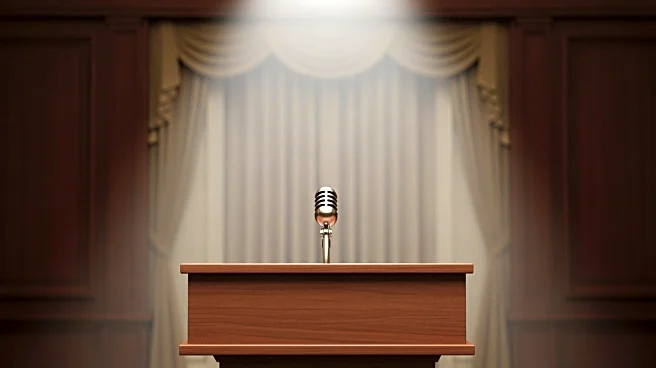What's Happening?
During the annual White House turkey pardoning ceremony, President Trump criticized Illinois Governor J.B. Pritzker, referring to him as a 'big, fat slob.' The remarks were made in the context of discussing
Chicago's crime issues and the state's refusal to accept federal assistance. Trump expressed frustration with Pritzker and Chicago Mayor Brandon Johnson for not requesting federal help to address crime in Chicago. The event, which included the pardoning of turkeys named Waddle and Gobble, saw Trump using humor to address political rivals, particularly focusing on Pritzker's weight and the state's policies on crime.
Why It's Important?
The comments made by President Trump highlight ongoing tensions between federal and state leadership regarding crime management in major cities like Chicago. Trump's criticism of Pritzker underscores the political divide over how to handle urban crime, with federal authorities advocating for more intervention. This situation reflects broader debates on state versus federal jurisdiction in law enforcement and public safety. The exchange also illustrates the personal nature of political discourse, where personal attributes are used to criticize policy decisions, potentially affecting public perception and political alliances.
What's Next?
The remarks may lead to further political exchanges between President Trump and Governor Pritzker, potentially influencing public opinion and policy discussions on crime management in Illinois. Stakeholders, including local government officials and community leaders, may respond to Trump's comments, either defending current policies or advocating for changes. The situation could also impact future federal-state collaborations on crime prevention and public safety initiatives, as political dynamics continue to evolve.
Beyond the Headlines
The incident raises questions about the role of personal attacks in political discourse and their impact on governance. It highlights the intersection of personal image and political effectiveness, where leaders' physical attributes are used as a basis for criticism. This approach can distract from substantive policy discussions and may influence public engagement with political issues. The event also reflects the broader cultural dynamics of political humor and its role in shaping public narratives.









